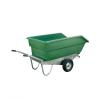
If you have been reading our blogs for a while, you will know we like to focus on nutrition. We often talk about the micro and macronutrients that a horse needs to enhance their well-being, improve their condition, and maximise performance. But the element within a horse's diet that cannot be overlooked, especially during intense heat, is their water consumption.
Here are five things to consider to ensure that your horse has sufficient water to stay well hydrated:
- Quantity
Horses can consume anywhere between 20-55 litres of water, so on hot days when they are likely to drink more, you must monitor their water to make sure they don’t run out.
Check how many litres of water your bucket holds as this will inform you of how many times you may need to fill it up. Our large yellow Tough Buckets, for example, hold 20ltrs, so one horse will likely need at least 2 buckets worth of water, and ideally 3! Remember, however, if your horse is out in the field with another horse, a bucket this size would need to be filled up at least 4-5 times per day! So, choose your buckets/water source wisely to make sure each horse can get all the water they may need.
You can assess if your horse is well hydrated in a few easy ways. Check that your horse's gums are moist (test 1) and pinch a small area of skin on their neck or shoulder and assess how long it takes to return to the original position (test 2). A well-hydrated horse will have moist gums and if its skin is pinched it will quickly bounce back to the original position. If a horse is dehydrated its gums will be drier and the skin will go back slowly after being pinched.
Rather than relying on topping up buckets, you may want to check out our range of large Horse drinkers. These large drinkers can be attached to pipework or can be left as a standalone item in a paddock or yard.
- Pasture
If your horse is turned out for grazing, it can obtain moisture from pasture, with fresh pasture having an approximately 60–80% moisture content. In contrast, horses that are kept in and fed grains, concentrates, and baled hay will obtain far less moisture through their food. This means that horses that are kept in will need to drink more water, compared to horses that are able to graze on fresh pasture. Of course, during the heat of the summer, even the best pastures become parched, making the grass dry and brown. When horses graze on very short grass they can ingest sand and dirt, therefore a supplement such as TRM’s SandXpell is essential to make sure the sand particles do not build up and cause digestive tract issues.
If your pasture is becoming parched or you are using sand arenas - don’t forget a water sprayer/sand sprayer can be a very effective way to keep the dust down.
- Weather & Exercise
External factors such as weather and exercise will affect the amount of water a horse will need. A horse will need to consume more water if they are in regular exercise and during the hot humid weather. This is because they will sweat more. Horses will also lose a great deal of body salts in their sweat, so it is a really good idea to supplement with an electrolyte during the heat or if your horse is in intensive training. Isotonic replacers such as IsoPro perfectly match a horse's ratio of salts – but when offering an electrolyte mixed with water, you should always offer a bucket of clean, fresh water.
Nevertheless, bear in mind that some horses actually drink more water in the winter than in the hot summer. This is because the quality of forages is generally not as good as in the summer as pasture can come very dry and lose its moisture content.
- Overall health
Some health factors will affect your horse's water requirements. For example, if your horse has had diarrhoea or is prone to kidney disease it will require more water to replace the water loss or to assist in flushing toxins out of the body. Horses that are recovering from an illness or injury will also require more water.
- Source
Horses should always be offered a fresh water supply, even if you have natural sources of water, such as ponds or streams, within their field. This is because not only may they not be as easy or safe to access, but their quality cannot be guaranteed. Natural water sources may be polluted or unsafe to drink due to varying algae blooms throughout the year.
If you should also monitor the behaviour of horses that are turned out together because if a horse is being chased away from the water trough, you should consider adding a second trough in the field.
There are many different shapes and sizes of water troughs and buckets to choose from at Farm & Stable – whether you need a trough to suit a field with horses and sheep grazing together, or a bucket that’s just the right colour and size, we have what you need.
Related articles:
What are electrolytes and why are they so important for your horse?
Summer guide to a healthy horse: How to beat 5 struggles of summer
Everything you need to know about B Vitamins for horses


 Forgotten your password?
Forgotten your password?  Free Delivery on all orders over £95+VAT
Free Delivery on all orders over £95+VAT







